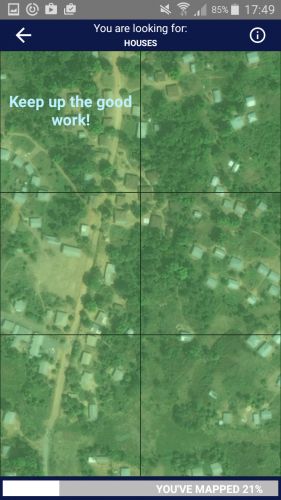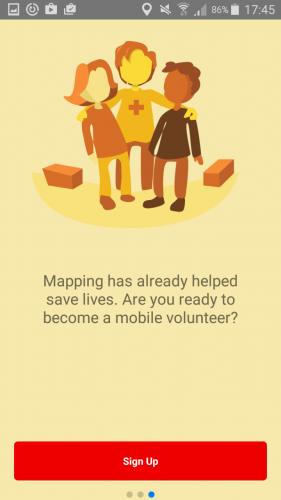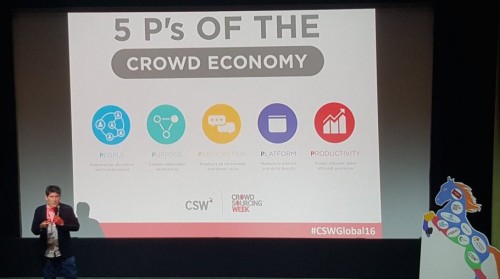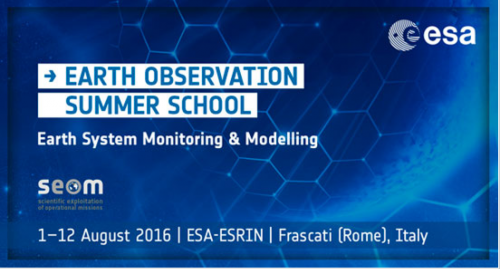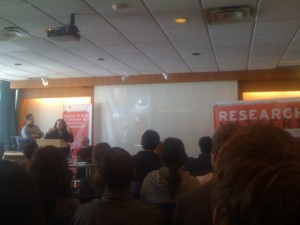If learning is about the diverse journeys, then travel metaphors seem appropriate. Mozilla Drumbeat’s Learning, Freedom and the Web brought over 400 people to Barcelona, Spain for a 3-day event. Normally, I save highly personal introspective writing for other spaces. But, there is value in reflection on the greater journey of learning and the open web.
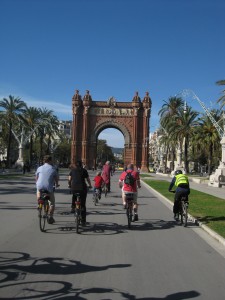
Arc de Triomf, Barcelona Spain
What do Traveling and the Open Web have in Common?
Accessible to Novices
I’m a novice, armchair traveler. In fact, I own every Pico Iyer book and am obsessed with travel shows and movies. But, I am new to feeding my wanderlust. Attending the festival meant that I had to grapple with awkward, disorienting and exasperating moments that come with travel. Love it! While I’ve previously traveled to Australia, Ireland, Dominican Republic (resort) and throughout Canada and the United States, Barcelona offered brand new lessons. First off, I have become so reliant on my smart phone for directions, planning and networking that it was hard to be off-network. Traveling is about happenstance. You can advance plan, but there are still moments when a physical map or guide would help. Just like the Open Web, cities are completely accessible if you seek the opportunity to find a common language and navigate the discomfort of new experiences with a smile.
Back up your Data
A new friend was robbed at night walking in a public square. She lost her passport, money, safety and energy. All the travel guides that tell you to use a money belt and only carry a photocopy of your passport. What they don’t give is a human face of a ruined trip and the pall of fear that settles on the victim and their companions. It was a huge teaching moment and a very real experience in Barcelona. As a dreamer and wanderer, this could easily have been my story. As a geek, I know to plan for privacy, security, phishing attacks and backing up my offline and online data. The Open Web has to grapple with these barriers. But, it our responsibility as early adopters and change agents to teach and to share this knowledge in accessible ways across multiple communication channels, languages and learning styles. And, we need to have alternate/backup plans when things go awry.
Group Travel
We mostly traveled in groups during the event. Fortunately, late nights included new friends walking each other to hotels. Learning can sometimes be more rewarding in groups. It provides the opportunity for laughter and exploration in a safe way while capitalizing on the best knowledge available. With CrisisCommons, we are are focused on crowdsourcing and collaboration. We are traveling in a corner of the Open Web that builds an ever evolving community reliant on collaboration, trust and the best available knowledge.
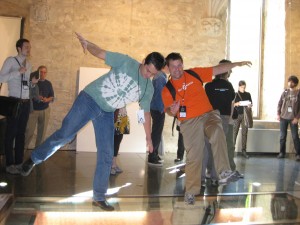
Torben and Stian hanging out in the Badge Lab, Drumbeat
Make New Friends
Traveling to a new place provides an opportunity to make new friends. Drumbeat had a large safety net of old friends and new collaborators; the event was full of brilliant, engaging minds. Often, we found ourselves wandering around the city after connecting at sessions. I met people from Argentina, Brazil, Norway, Germany, UK, Ireland, Italy and Austria. And, of course, attendees from across Canada and the US. While it wasn’t a complete global event, there is an opportunity to grow in that direction. An Open Web cannot be built in a vacuum. This needs to start somewhere. I’m a firm believer that great things have been started as a result of the connections of Open Web and Open Education advocates united at Drumbeat. We made new friends and explored ways to create these spaces.
Getting Lost
My favourite part of traveling is independent wandering. This was somewhat curtailed by the fear of robbery. Fortunately, I found a work-around patch by way of a bicycle tour which afforded me the opportunity to explore with some sense of independence. Not being able to freely walk around at night was the hardest part about this trip for me. Now, I think about travel with the layer of accessibility, safety and fear. Learning this navigation in Barcelona is completely invaluable. It will help me move from a novice traveler someday. Open Web advocates need to find ways to open these very doors of accessibility, fear of change and learning styles. Without doing this, we will be at the same stage next year talking to ourselves rather than stirring it up on a larger scale. We need to get lost and be independent of our common alliance. This will allow us to share rather than tell.
Architecture teaches you
Barcelona is full of beauty with architectural brilliance from Gaudi to Gehry to Meir that can stop your breath. It teaches you perspective, design, spatial awareness and more. It is a moment of discovery to explore new visions of urbanism. The Drumbeat event was full of great moments and ideas that offered similar experiences. The Open Web is full of this opportunity to be jaw-droppingly awesome. But we need to consider the architecture around us. We can compliment and create spaces large and small that allow for imagination and spirit.
Attending Mozilla Drumbeat Festival of Learning, Freedom and the Web was a true honour. Thank you to Mozilla for the great opportunity to be on this journey. Special thanks to Mark Surman, Mitchell Baker, Allen Gunn, Nathaniel James, Matt Thompson, Matt Garcia, Kate Guernsey, Yolanda Hippensteele, Maria Sole, and all the Mozilla crew. More thanks as well to the new friends, innovators, and instigators I encountered.
(I will write a separate post on the content of the Drumbeat event. )
Heather

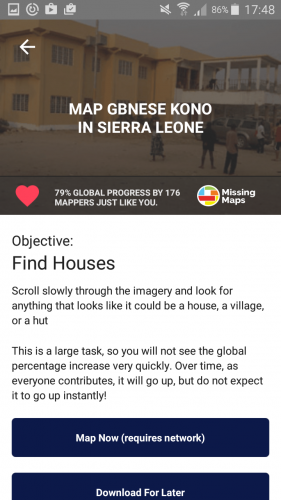 “In a humanitarian crisis, the location of the most vulnerable people is fundamental information for delivering food, shelter, medical care and other services where they are most needed. And, although it may be hard to believe, millions people around the world are not represented on any accessible map.” (Pete Masters, Missing Maps Coordinator, MSF, July 14, 2016)
“In a humanitarian crisis, the location of the most vulnerable people is fundamental information for delivering food, shelter, medical care and other services where they are most needed. And, although it may be hard to believe, millions people around the world are not represented on any accessible map.” (Pete Masters, Missing Maps Coordinator, MSF, July 14, 2016) 